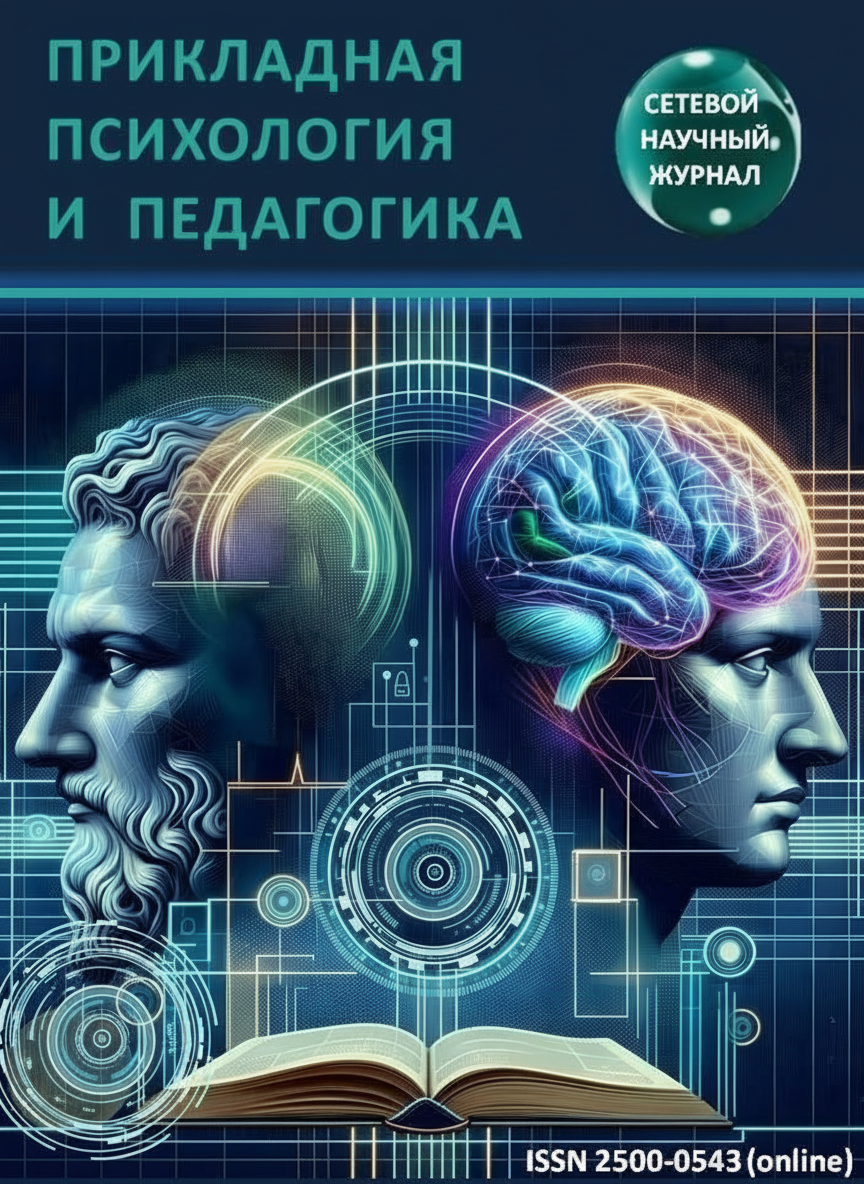from 01.01.2023 until now
Saint Petersburg, Russian Federation
UDC 37
The article discusses the relationship between fatigue and the peculiarities of the mental state of ATS employees, including discussing which types of moods are dominant among ATS employees with different values of fatigue. The study involved 470 employees of the Department of Internal Affairs who underwent initial training and advanced training at the St. Petersburg University of the Ministry of Internal Affairs of Russia (312 male employees, 158 female employees with service experience from 1 year to 15 years). The following psychodiagnostic techniques were used: the questionnaire "Determination of the dominant state" (L. V. Kulikov), the questionnaire "Subjective assessment of the level of fatigue of the individual" (S. V. Dukhnovsky, E. K. Shelepina). During the correlation analysis, significant relationships were established between the fatigue indicator (according to the method of "Subjective assessment of the level of fatigue of the individual") and such parameters of the dominant mental state as "active (passive) attitude to the situation", "cheerfulness (despondency)", "high (low) tone", "looseness (tension)", as well as "life satisfaction" according to the method of "Determining the dominant state". During the comparative analysis, significant differences in the characteristics of the mental state of police officers with different values of fatigue were established. Among other things, it was found that for employees of the Department of Internal Affairs with low fatigue values, the dominant types of mood will be "inspired" and "prosperous"; with moderate values - "active"; and with high values - "sad (melancholic)".
fatigue, tone, activity, cheerfulness, mental state, mood, official activity
1. Abdrakhmanova A. Sh., Mavliev F. A., Akhmetov I. I., Nazarenko A. S. Fatigue: understanding the problem and systemic mechanisms of its development. Nauka i sport: sovremennye tendencii [Science and sports: current trends], 2022, №. 1, pp. 6-17. (in Russian).
2. Bodrov V. A. Professional'noe utomlenie: fundamental'nye i prikladnye problemy [Professional fatigue: fundamental and applied problems]. Moscow: In-t psikhologii RAN Publ., 2009. 221 p.
3. Velichkovsky B. B. Cognitive effects of mental fatigue. Vestnik Moskovskogo universiteta Seriya 14: Psikhologiya [Bulletin of the Moscow University. Episode 14: Psychology], 2019, № 1, pp. 108-122. (in Russian).
4. Ganzen V. A., Yurchenko V. N. Systematics of human mental states. Vestnik LGU. Ser.6. [Bulletin of LGU. Ser.6.], 1991, №1, pp. 47-55. (in Russian).
5. Gorbov F. D., Lebedev V. I. Psikhonevrologicheskie aspekty truda operatorov [Psychoneurological aspects of operators' work]. Moscow: Medicina Publ., 1975. 207 p.(in Russian)
6. Dmitrieva M. A., Krylov A. A., A. I. Naftulyev Psikhologiya truda i inzhenernaya psikhologiya [Occupational Psychology and engineering Psychology]. Leningrad: Izd-vo LGU Publ., 1979. 220 p.(in Russian)
7. Dukhnovsky S. V., Shelepina E. K. Questionnaire "Subjective assessment of the level of fatigue of personality": development, psychometric characteristics, application. Rossijskij deviantologicheskij zhurnal [Russian Deviantological Journal], 2024, № 2, pp. 144-160. (in Russian).
8. Zavalova N. D., Ponomarenko V. A. Mental states of a person in special conditions of activity. Psikhologicheskij zhurnal [Psychological Journal], 1983, T. 4, № 6, pp. 92-106. (in Russian).
9. Commandantov G. L. The problem of fatigue. Izbrannye lekcii po aviacionnoj medicine [Selected lectures on aviation medicine], 1983, pp. 72–113. (in Russian).
10. Krasilov O. V. The effect of fatigue on the body's performance in the professional activities of police officers. Aktual'nye problemy bor'by s prestupleniyami i inymi pravonarusheniyami [Actual problems of combating crimes and other offenses], 2017, № 17-2, pp. 153-155. (in Russian).
11. Kulikov L. V. Psikhogigiena lichnosti Voprosy psikhol. ustojchivosti i psikhoprofilaktiki [Psychohygenism of personality Issues of psychology. sustainability and psychoprophylaxis]. Saint Petersburg: Piter Publ., 2004. 463 p.(in Russian)
12. Kulikov L. V. Psikhologiya nastroeniya [Psychology of mood]. Saint Petersburg: Izd-vo S. -Peterb. un-ta Publ., 1997. 225 p.(in Russian)
13. Kulikov L. V. Rukovodstvo k metodikam diagnostiki psikhicheskikh sostoyanij, chuvstv i psikhologicheskoj ustojchivosti lichnosti. Opisanie metodik, instrukcii po primeneniyu [A guide to the methods of diagnosis of mental states, feelings and psychological stability of lichnost. Description of the methods, instructions for use]. Saint Petersburg, Publ., 2003. 81 p.(in Russian)
14. Levitov N. D. O psikhicheskikh sostoyaniyakh cheloveka [About human mental states]. Moscow: Prosveshchenie Publ., 1964, 344 p.(in Russian)
15. Leonova A. B. Psikhodiagnostika funkcional'nykh sostoyanij cheloveka [Psychodiagnostics of human functional states]. Moscow: Izd-vo MGU Publ., 1984, 82 p.(in Russian)
16. Makhnach A V. Component analysis of the mental state of a person in special conditions of activity. Psikhologicheskij zhurnal [Psychological Journal], 1991, T. 12 №1, pp. 66-76. (in Russian).
17. Nemchin T. A. Sostoyaniya nervno-psikhicheskogo napryazheniya [States of neuropsychic tension]. Leningrad: Izd-vo LGU Publ., 1983. 166 p.(in Russian)
18. Prokhorov A. O. Functional structures of mental states. Psikhologicheskij zhurnal [Psychological Journal], 1996, № 3, pp. 9-18. (in Russian).
19. Solodkov A. S. Features of fatigue and recovery of athletes. Uchenye zapiski universiteta im. P.F. Lesgafta [Scientific notes of the P.F. Lesgaft University], 2013, № 6(100), pp. 131-143. (in Russian).
20. Shelepina E. K. Cognitive indicators of fatigue and efficiency of police officers. Aktual'nye problemy psikhologii pravookhranitel'noj deyatel'nosti: koncepcii i tekhnologii resheniya (Vasil'evskie chteniya - 2024): Materialy mezhdunarodnoj nauchno-prakticheskoj konferencii, Sankt-Peterburg, 26–27 aprelya 2024 goda. – Sankt-Peterburg: Sankt-Peterburgskij universitet MVD RF [Cognitive indicators of fatigue and efficiency of police officers // Actual problems of psychology of law enforcement: concepts and technologies of solution (Vasilievsky readings - 2024): Materials of the international scientific and practical conference, St. Petersburg, April 26-27, 2024. – St. Petersburg: St. Petersburg University of the Ministry of Internal Affairs of the Russian Federation], Saint Petersburg, 2024, pp. 855-859. (in Russian).














